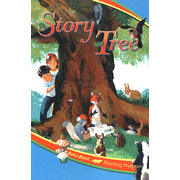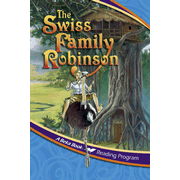Grades We’ve Used: 2nd, 3rd, 4th
Summary:
Each grade we’ve used has a series of readers the size and thickness of a normal chapter book. Most have multiple short stories and poems, some are actual chapter books. Many of them are about key historical events and figures written from a Christian viewpoint. Discussion questions are sprinkled throughout. In 4th grade new vocabulary is also introduced, with the definition of the word printed at the bottom of the page it’s used on. These words are in addition to the vocab in the Spelling curriculum.
Starting in 4th grade, there are extra chapter books for book reports.
3rd and 4th grades have Read and Think Skill Sheets, which are timed reading with multiple choice questions at the end to test comprehension. 
An answer key has answers to the questions, or teacher’s editions are available for each reader.
Marie’s Review (Mom):
In A Nutshell:
Even I enjoy most of the stories in the readers, and the discussion questions are well thought out. Like any curriculum though, this will work well with some kids and not for others, depending on their personality and learning style.
Unfortunately, A Beka is missing a key part of what I feel is a must in any reading curriculum.
Some More Detail:
While I really do like A Beka’s readers, I feel there is a BIG hole in their curriculum. A Beka does not discuss concepts such as character, plot, main idea, setting, details… I could not find them ANYWHERE in the scope and sequence, and I looked all the way through 8th grade. I’ve yet to encounter them in the grades we’ve used. Grace, having only ever used A Beka, has NO IDEA what a plot is. Yet she is an avid reader, testing at an 11th grade level. Below I copied a small portion of BJU’s 2015 2nd grade scope and sequence:
Main character; character development, motives, traits
Setting; plot; point of view; fanciful elements; idioms; imagery; similes; figurative language
If I have missed this somewhere in A Beka, someone please let me know!
We have continued to use A Beka for Grace’s reading program, although she finished all the readers shortly after Christmas. I chose to use books from Sonlight’s* list rather than the others provided by A Beka. We may go back and read them at another time.
We used A Beka for Lainey for 2nd grade and for the beginning of 3rd grade, but it just wasn’t working so we switched to BJU and repeated 2nd grade reading. She has done extremely well with BJU and I don’t think we’ll go back to A Beka with her.
Grace’s Review (4th grade): Some of the stories are really interesting, some are just okay. I’m glad there aren’t more readers for each grade. I like reading regular books better.
Lainey’s Review (3rd grade): I like the stories better than BJU’s. I’m looking forward to reading the 3rd grade ones that Grace read last year. They were way too hard though at the beginning of the year.
Christian Friendly: Yes.
Sensitive Readers: Green Light – Although I haven’t read every single page, I think they are pretty well sanitized. I haven’t come across anything I think would cause a problem for sensitive children.
*The Family Book List is an affiliate of Christian Book Distributors and receives a fee from purchases made through the links provided. We also are part of Sonlight’s rewards program, and receive a reward when we refer new customers through the links provided.




I experienced BJU reading K-2 and struggled learning to read. In third we switch completely to A Beka and I improved drastically. I continued with the total A Beka program. Now, as an adult, I have seen similar situations with many students I’ve taught. As we homeschool our daughter using the complete A Beka Academy DVD program, we are thrilled to hear our young daughter excelling in reading and comp. It would be difficult to accurately evaluate the A Beka reading program as a stand alone function since it has been designed to work so cohesively with the grammar, spelling, and penmanship as a Language arts program. Because of the complete A Beka program, I was totally prepared for college and tutored those who had not experienced a program as strong.
LikeLike
Hi Lillypads3,
Thank you for your insight! My girls were in a school for a few years that used A Beka exclusively, and the phonics and language worked great for my oldest. But I was left scratching my head when it didn’t work for my middle one. Again, it’s probably just learning style; she really improved with BJU’s Reading program. Let me ask you though, when and where does A Beka address concepts like plot, point of view, how to write a paragraph, etc? Did I totally miss it somewhere by not using the whole curriculum? This year I’ve switched to writing based instead of worksheet based curricula (except for BJU Reading), so we’ll see how it goes!
Thanks again for your thoughts! =)
Marie
LikeLike
Precept upon precept is many times the foundational difference between a traditional, teacher-directed curriculum and other philosophies. A Christian education approach, will develop a basic foundation and build incrementally with continuous review. If one is committed to this philosophy, then perhaps A Beka would meet your criteria. A Beka is know for its intensive phonics approach and as the student moves on to upper elementary, the strong emphasis on grammar rules and structure. Once these concepts are secured, then A Beka opens the door to applying all that has been learned through literature analysis and creative writing. By sixth grade a large amount of class time (language, penmanship, reading) is spent on learning different types of composition, writing types, and techniques. Critical writing assignments and literature analysis increase again more significantly in the 7-12 curriculum as students begin to apply Biblical values and reasoning skills in not only language arts assignments but in history and math. (I believe, without copying the scope and sequence in this reply, in a complete overview of the A Beka curriculum you will find that all of those concepts you mentioned are well-taught.)Many times, secular curricula choose to emphasize writing over grammar at a premature stage, which would follow the more progressive philosophy that a child directs his own learning, formulates his own reality, and creates his own knowledge. The secular teacher would then not be concerned with grammatical or structural errors in the students writing. (This philosophy is similarly followed in secular history texts as a publisher might give more text space to Marilyn Monroe as opposed to George Washington creating a very unbalanced text which, from a Christian perspective, gave insufficient time to the study of America’s first President.) From a teaching perspective, I have experienced students who were given a writing focused plan in lower elementary. Unfortunately, their inability to express their thoughts without significant grammar and spelling errors only detracted from the message they wished to convey through writing and, in the end, caused the student to spend extra time in tutoring “catching up” on the basics they should have already learned. As a teacher, as time permitted, it was a simple task to observe my students, note their various learning styles and add additional comprehensive writing assignments to various subjects if needed, while maintaining a traditionally based Christian philosophy. What wasn’t easy, was to cement the tools of grammar into the student’s mind that should have been taught over time throughout the early elementary years. Thankfully, God has given many talents, and as a teacher or, now, homeschool parent, we should endeavor to help the student discover those talents and further refine them for God’s glory. No doubt, many would disagree immediately, especially with computers and texting, etc. of today, and want to skip the task of learning the grammar rules and move on to what might be the more enjoyable writing assignments. However, once again, if one is committed to a traditional, Christian philosophy of education, then finding a curriculum that teaches precept upon precept, correlating each subject into one unified education plan – learning rules, learning to follow them, learning that there is a correct way of doing things, and then learning to evaluate and think critically, and communicating those thoughts through writing – will be the goal. My suggestion to homeschoolers searching for the “right” curriculum is to first develop your philosophy of education; second, seek out a publisher who meets that criteria; third, commit to use the publisher’s material as it has been designed as your basic foundation; fourth, observe your student and direct them further in areas of excellence or weakness. To end with a blunt example: I was asked to tutor a young child in reading. The mother said, “I simply don’t understand why he isn’t getting this. I’m using A Beka which is suppose to be the best in phonics. I give him the Handbook for Reading everyday and tell him to study it and learn that stuff!” Needless to say, the child had not learned to read, and that was not due to the curriculum, but the improper usage of the curriculum. Teaching sure is a BIG responsibility! May the Lord bless as we strive to do our best for our children.
LikeLike
Sorry for the delay in replying! Hopefully this isn’t too disjointed – I’ve had a zillion interruptions =)
I found your reply gave me a lot of food for thought over the weekend. Thank you too for clarifying some of the philosophies behind A Beka. I was taught in public school so your explanation sounds pretty accurate – I don’t remember learning much of anything about the founding fathers! This is probably where my ideas of writing more and worksheets less have come from too. I vividly remember being required to write 3 page stories by 4th grade. I’ve found too though that we naturally gravitate towards a Charlotte Mason approach in all subjects. While I don’t necessarily think A Beka is right for my oldest two, I completely agree with you in that whatever approach/curriculum used, it needs to be used as intended! I truly appreciate your comments and the time you took to reply, it’s something I will certainly be keeping in mind as we try out a stronger Charlotte Mason approach and as I choose curriculum for my youngest. Thanks and God Bless! =)
LikeLike